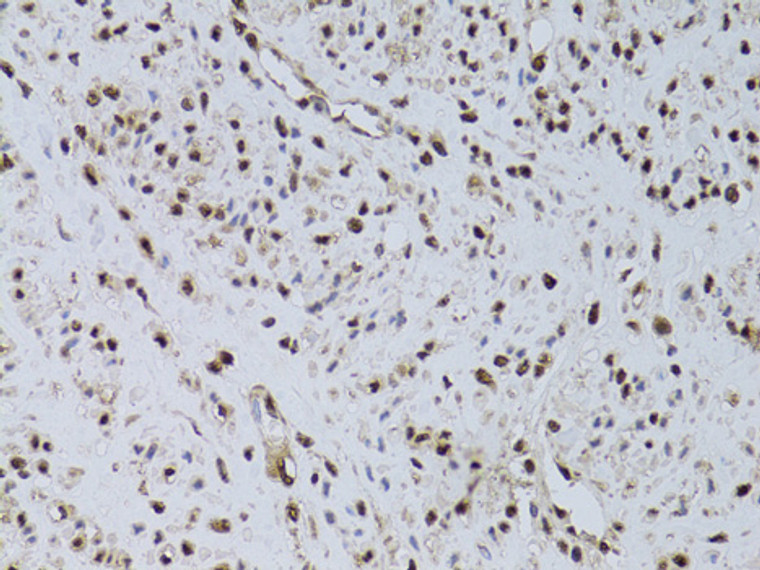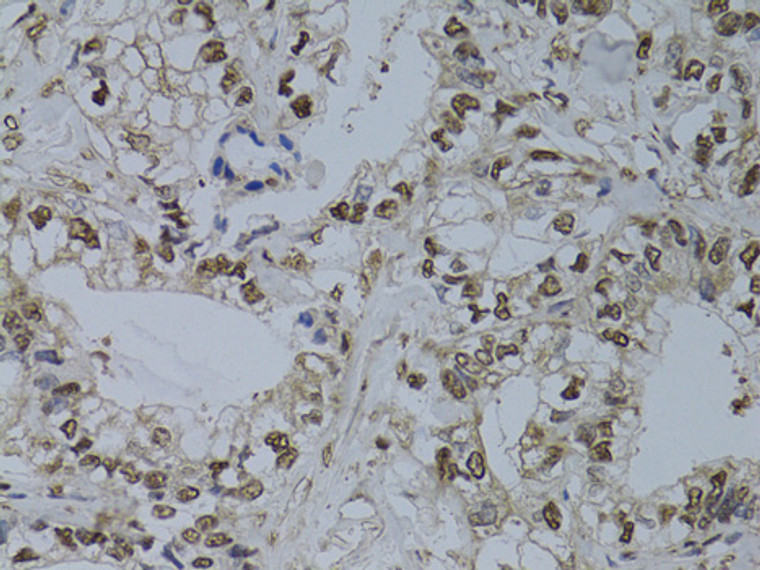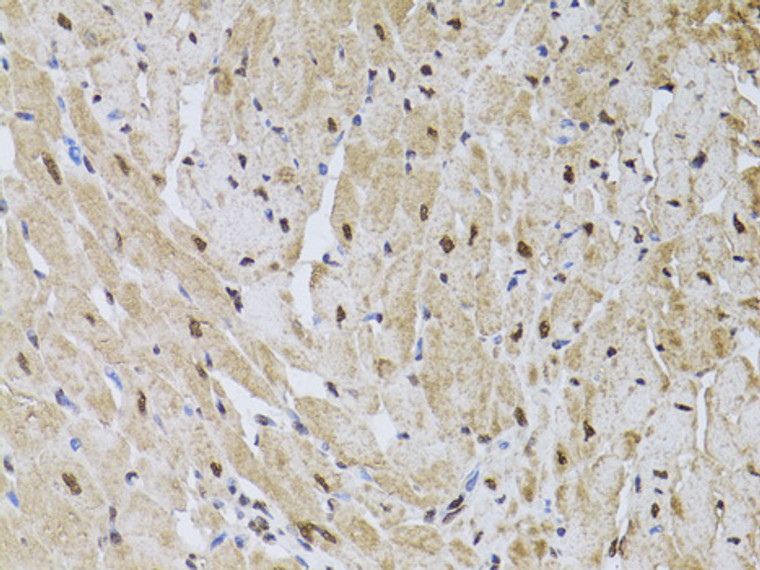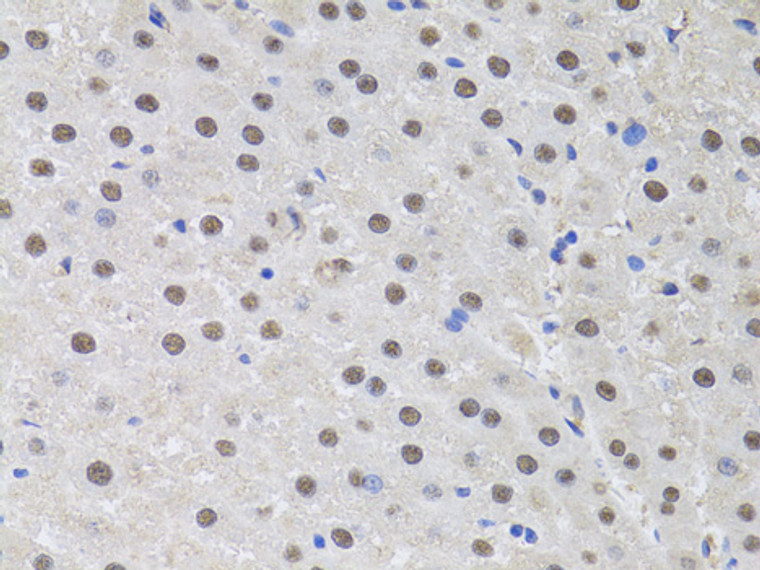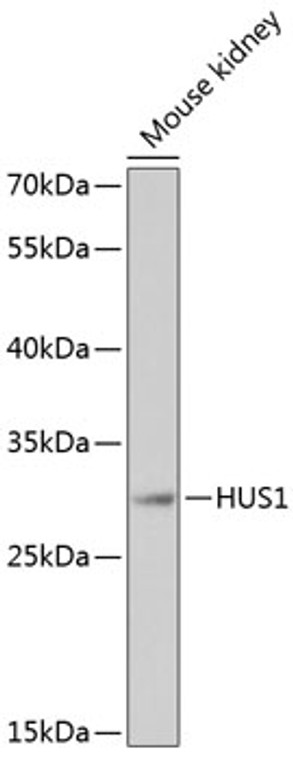| Host: |
Rabbit |
| Applications: |
WB/IHC |
| Reactivity: |
Human/Mouse/Rat |
| Note: |
STRICTLY FOR FURTHER SCIENTIFIC RESEARCH USE ONLY (RUO). MUST NOT TO BE USED IN DIAGNOSTIC OR THERAPEUTIC APPLICATIONS. |
| Short Description: |
Rabbit polyclonal antibody anti-HUS1 (1-280) is suitable for use in Western Blot and Immunohistochemistry research applications. |
| Clonality: |
Polyclonal |
| Conjugation: |
Unconjugated |
| Isotype: |
IgG |
| Formulation: |
PBS with 0.02% Sodium Azide, 50% Glycerol, pH7.3. |
| Purification: |
Affinity purification |
| Dilution Range: |
WB 1:500-1:2000IHC-P 1:50-1:100 |
| Storage Instruction: |
Store at-20°C for up to 1 year from the date of receipt, and avoid repeat freeze-thaw cycles. |
| Gene Symbol: |
HUS1 |
| Gene ID: |
3364 |
| Uniprot ID: |
HUS1_HUMAN |
| Immunogen Region: |
1-280 |
| Immunogen: |
Recombinant fusion protein containing a sequence corresponding to amino acids 1-280 of human HUS1 (NP_004498.1). |
| Immunogen Sequence: |
MKFRAKIVDGACLNHFTRIS NMIAKLAKTCTLRISPDKLN FILCDKLANGGVSMWCELEQ ENFFNEFQMEGVSAENNEIY LELTSENLSRALKTAQNARA LKIKLTNKHFPCLTVSVELL SMSSSSRIVTHDIPIKVIPR KLWKDLQEPVVPDPDVSIYL PVLKTMKSVVEKMKNISNHL VIEANLDGELNLKIETELVC VTTHFKDLGNPPLASESTHE DRNVEHMAEVHIDIRKLLQ |
| Tissue Specificity | Ubiquitous. |
| Function | Component of the 9-1-1 cell-cycle checkpoint response complex that plays a major role in DNA repair. The 9-1-1 complex is recruited to DNA lesion upon damage by the RAD17-replication factor C (RFC) clamp loader complex. Acts then as a sliding clamp platform on DNA for several proteins involved in long-patch base excision repair (LP-BER). The 9-1-1 complex stimulates DNA polymerase beta (POLB) activity by increasing its affinity for the 3'-OH end of the primer-template and stabilizes POLB to those sites where LP-BER proceeds.endonuclease FEN1 cleavage activity on substrates with double, nick, or gap flaps of distinct sequences and lengths.and DNA ligase I (LIG1) on long-patch base excision repair substrates. The 9-1-1 complex is necessary for the recruitment of RHNO1 to sites of double-stranded breaks (DSB) occurring during the S phase. |
| Protein Name | Checkpoint Protein Hus1Hhus1 |
| Database Links | Reactome: R-HSA-176187Reactome: R-HSA-5685938Reactome: R-HSA-5693607Reactome: R-HSA-5693616Reactome: R-HSA-6804756Reactome: R-HSA-69473Reactome: R-HSA-9709570 |
| Cellular Localisation | NucleusCytoplasmCytosolIn Discrete Nuclear Foci Upon Dna DamageLocalized Also In The CytoplasmDna Damage Induces Its Nuclear TranslocationShuttles Between The Nucleus And The Cytoplasm |
| Alternative Antibody Names | Anti-Checkpoint Protein Hus1 antibodyAnti-Hhus1 antibodyAnti-HUS1 antibody |
Information sourced from Uniprot.org
12 months for antibodies. 6 months for ELISA Kits. Please see website T&Cs for further guidance

